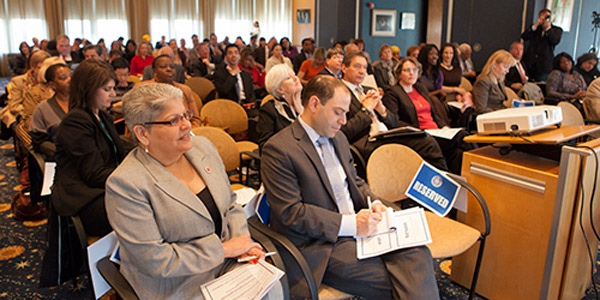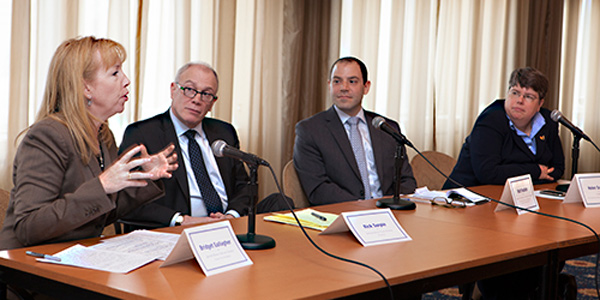1199 Homecare Workers Join With City Council Speaker, Healthcare Experts in Summit on Improving Care in NYC
May 6, 2013
1199SEIU homecare workers joined industry leaders and experts in a summit on April 22 to discuss the increasingly important role home care workers play in providing New York City’s aging population with quality care in the comfort of their own homes. The event, “Home Care Aides: Building the Care Delivery System for the Future,” was hosted by New York City Council speaker Christine Quinn in collaboration with 1199SEIU and PHI Policy Works.
The summit centered on how agencies can best support home care workers as the New York State Medicaid program transitions to managed long-term care and as the demand for care increases. Summit participants also addressed how these workers, if given the proper training opportunities and tools, are capable of taking on more responsibilities that will benefit themselves, the people they care for and the health care system as a whole.
“Home health aides care for our most vulnerable residents. They are a group of dedicated workers that this city needs and cares about,” Speaker Quinn said. “Taking care of our growing aging population also means taking care of their caretakers, and investing in this workforce could lead to an overall reduction of health care spending, fewer hospitalizations, and better outcomes for the most vulnerable New Yorkers.”
Keynote speaker Jason Helgerson, New York State’s Medicaid Director, explained that the more than 150,000 homecare workers in New York City make this its largest single occupation, and one which is expected to continue to grow. For this reason, it is vital that homecare workers be paid a living wage. “We will not build the long-term care system on the backs of the workers,” he said.
Faith Wiggins, Director of the 1199SEIU Homecare Education Fund, led the panel “Home Attendants to Home Health Aides: New York City’s Response to a Changing System.” The panel focused on how 1199 and 1199’s Homecare Education Fund are collaborating with the Small Business Services of New York (SBS) and the City University of New York (CUNY) to meet the challenges of transitioning to managed care. The collaboration includes a pilot program in which Home Attendants have the opportunity to train to become Home Health Aides.
Zena McKenzie, an 1199 Home Health Aide and a peer mentor with the agency Best Choice, was among those on the panel “Promoting Quality Home Health Aide Training and Staffing,” which was led by Carol Rodat of PHI. Ms. McKenzie spoke about peer mentoring as a key way that an agency can support this workforce. “Through peer mentoring, we are able to encourage the new aide to develop skills that she can then use when caring for her clients,” she said. “Peer mentoring is about pulling aides out of isolation, addressing any problems they might be having and helping them to better do their jobs. Everybody benefits from this holistic approach.”
Helen Schaub, 1199 Vice President for Homecare New Organizing, led a panel on “Expanding the Aide’s Role to Meet Consumer Need,” which focused on specific programs that agencies and organizations are offering to bring more in-depth training to homecare workers. These programs can bring about better care coordination and management, and improve worker retention. Panelists included Matt Kudish of the Alzheimer’s Association, NYC Chapter, Bridget Gallagher of Jewish Home Lifecare System and Rick Surpin of Independence Care System.
Mr. Kudish described the Alzheimer Association's specialized dementia training program, which he said helps aides to build skills, empathy for clients with dementia and critical peer support. He reported that 78 percent of aides who completed this training want to stay on this job, compared with only 38 percent who had not. Mrs. Gallagher told how Jewish Home Lifecare has trained its aides to use telehealth technology with their clients, and called these workers instrumental in rolling this successful program out. Mr. Surpin discussed how Independence Care System is better utilizing the skills of aides by creating the senior aide title and training aides it. This way, aides are able to play a crucial role in the care team, and feel more respected and valued, benefiting the workers, the agency and, most importantly, the clients.



